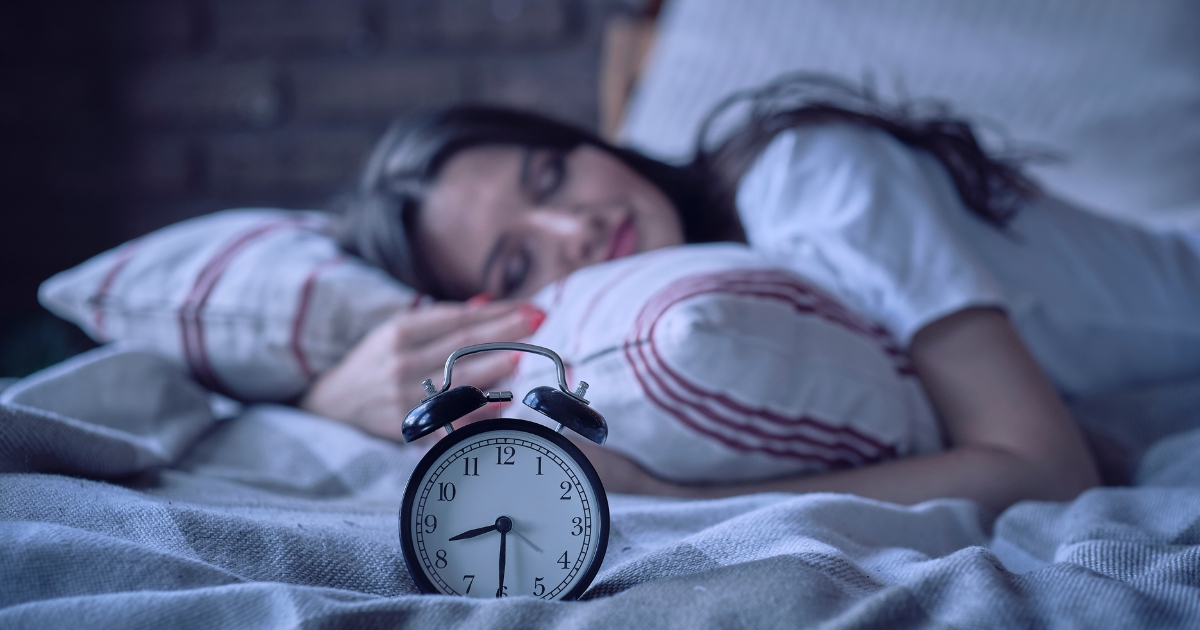At What Age Does Insomnia Develop?

Did you know that up to 30% of adults experience insomnia at some point in their lives? People of all ages can be affected by insomnia, which is defined by trouble sleeping or staying asleep.
However, its onset can vary depending on various factors. Understanding when insomnia typically develops can help you recognize early signs and seek help if needed.
This blog will explore the age at which insomnia commonly begins and discuss the factors that contribute to its development across different life stages. Whether you are a parent concerned about your child’s sleep or an adult struggling with sleepless nights, this guide will provide valuable insights into the age-related aspects of insomnia.
Understanding Insomnia
A sleep disorder called insomnia makes it difficult to go asleep, stay asleep, or both. There are two categories for it: acute and chronic. It typically lasts a few days to weeks and resolves on its own.
Chronic insomnia, on the other hand, occurs at least three times a week and persists for three months or longer. Chronic insomnia may require medical intervention.
The symptoms of insomnia go beyond just sleepless nights. Individuals who suffer from insomnia may feel tired during the day, become agitated, have trouble focusing, and perform worse at work or school.
Over time, chronic insomnia can lead to more serious health issues, such as depression, anxiety, cardiovascular problems, and a weakened immune system. Early diagnosis and treatment of these symptoms are essential because insomnia can negatively affect your quality of life if left untreated.
Whether insomnia manifests as difficulty falling asleep, frequent awakenings during the night, or waking up too early and being unable to go back to sleep, it is important to address it promptly to prevent long-term consequences.
Insomnia in Different Age Groups
Childhood (0-12 years)
While insomnia is less common in children, it can still occur. In childhood, insomnia may manifest as difficulty falling asleep, frequent nighttime awakenings, or early morning waking.
Possible causes include anxiety, irregular sleep schedules, and medical conditions like asthma or ADHD. Poor sleep hygiene, such as inconsistent bedtimes, can also contribute.
Though rare, childhood insomnia can have significant effects, leading to behavioral issues, mood swings, and learning difficulties. Parents should monitor their child’s sleep patterns and seek advice if sleep problems persist.
Adolescence (13-18 years)
Adolescence is a critical period for the onset of insomnia. Teenagers face a host of challenges that can disrupt their sleep, including hormonal changes, academic stress, and social pressures. The increased use of screens and late-night activities further complicates sleep patterns.
Hormonal shifts, particularly the delay in melatonin release, naturally push adolescents toward a later sleep schedule. This, combined with early school start times, can lead to chronic sleep deprivation and insomnia.
Insomnia in teenagers can impact academic performance, mood, and even physical health, making it important to address sleep issues early on.
Young Adulthood (19-40 years)
Insomnia often begins to rise during young adulthood, a period marked by significant lifestyle changes. College life, the start of a career, and relationship issues are common stressors that can disrupt sleep. Many young adults juggle multiple responsibilities, leading to irregular sleep schedules and poor sleep hygiene.
Additionally, lifestyle choices such as caffeine consumption, alcohol use, and irregular sleep patterns can contribute to insomnia. During this stage, insomnia can affect productivity, mental health, and overall well-being.
The key to preventing chronic insomnia is realizing the value of sleep and creating healthy routines.
Middle Age (41-60 years)
Insomnia can develop or worsen during middle age due to a variety of factors. Health problems that might disrupt sleep include arthritis, heart disease, and chronic discomfort. For women, menopause brings hormonal changes that can trigger insomnia, with hot flashes and night sweats being common culprits.
Additionally, stress related to work, aging parents, or financial concerns can keep middle-aged adults awake at night. Insomnia during this stage can have serious implications for physical and mental health, making it essential to address underlying causes and seek appropriate treatment.
Older Adults (60+ years)
Insomnia is more prevalent among older adults, with changes in sleep patterns being a natural part of aging. Older adults tend to have lighter, shorter sleep and may wake up more frequently during the night. Medical conditions, medication side effects, and chronic pain can further disrupt sleep.
Furthermore, a change in circadian rhythm—which results in earlier bedtimes and wake times—may occur in older persons. Insomnia in this age group can exacerbate existing health problems and contribute to cognitive decline. Older adults need to discuss sleep issues with their healthcare provider to manage insomnia effectively.
Factors Contributing to Insomnia at Various Ages
Biological Factors
Aging naturally affects sleep patterns, making insomnia more likely as we grow older. Hormonal changes, such as those during adolescence or menopause, can disrupt sleep.
Additionally, the body’s production of melatonin— the hormone that regulates sleep-wake cycles— decreases with age, leading to more frequent sleep disturbances.
Psychological Factors
Insomnia, regardless of age, is significantly influenced by stress, worry, and despair. In children, anxiety about school or family issues can lead to sleep problems. Teenagers may face stress from academic pressures or social situations.
In adults, work-related stress, financial concerns, and relationship issues often trigger insomnia. As people age, concerns about health, loss of loved ones, or loneliness can lead to depression and, consequently, insomnia.
Addressing these psychological factors through therapy or stress management techniques can help alleviate insomnia.
Lifestyle Factors
Your everyday routines and habits have a big impact on how well you sleep. A poor diet, inactivity, irregular sleep patterns, and an excessive amount of screen time are frequent lifestyle factors that lead to insomnia.
For example, teenagers and young adults may stay up late using electronic devices, which can interfere with the production of melatonin. In middle-aged and older adults, habits like drinking alcohol or caffeine late in the day can disrupt sleep
All age groups can greatly benefit from improved sleep quality through the adoption of healthy living practices and a consistent sleep schedule.
Environmental Factors
The setting in which you sleep has a big influence on how well you can fall and stay asleep. Children may struggle with sleep if their bedroom is noisy or if they share a room with siblings. Teenagers may have difficulty sleeping in a cluttered or uncomfortable room. Adults and older adults may be sensitive to temperature, light, or noise levels.
Additionally, life changes such as moving to a new home or adjusting to a new work schedule can disrupt sleep patterns. Creating a sleep-friendly environment by controlling light, noise, and temperature can help minimize these disruptions and improve sleep.
When to Seek Help?
Red Flags
If you experience insomnia that lasts for more than a few weeks, it may be time to seek professional help. Other red flags include difficulty functioning during the day due to lack of sleep, increased irritability, frequent headaches, and reliance on sleep aids.
Chronic insomnia can also lead to depression, anxiety, or other health issues, which require medical attention. If insomnia is interfering with your daily life or causing significant distress, consult a sleep dentist for further evaluation.
Treatment Options
There are several treatment options available for insomnia. A very successful non-pharmaceutical method for helping people improve unfavorable attitudes and sleep-related behaviors is called Cognitive Behavioral Therapy for Insomnia (CBT-I). Medications, such as prescription sleep aids or over-the-counter options, can be used short-term under a doctor’s guidance.
Lifestyle changes, such as establishing a regular sleep schedule, reducing caffeine intake, and creating a relaxing bedtime routine, are also important. In some cases, addressing underlying medical or psychological issues can resolve insomnia.
Preventive Measures
Preventing insomnia involves maintaining healthy sleep habits throughout your life. Set a consistent sleep schedule by going to bed and waking up at the same time every day, even on weekends.
Create a relaxing bedtime routine, such as reading a book or taking a warm bath, to signal to your body that it’s time to sleep. Limit screen time before bed and avoid consuming caffeine or alcohol in the evening.
Regular physical activity can also promote better sleep but try to exercise earlier in the day to avoid overstimulation at night. By adopting these habits, you can reduce your risk of developing insomnia at any age.
Insomnia can develop at any stage of life, from childhood through old age, influenced by a variety of factors. Recognizing the signs and understanding the age-related aspects of insomnia can help you take proactive steps to manage it.
Whether you are dealing with stress in adolescence, career pressures in young adulthood, or health concerns in older age, addressing insomnia early can improve your overall quality of life. If you or a loved one is struggling with insomnia, do not hesitate to seek help. Your sleep health is vital to your well-being.

